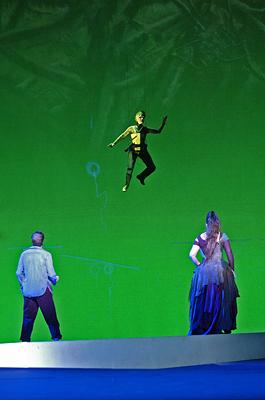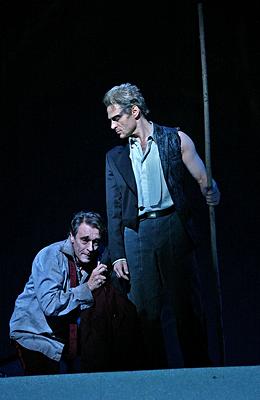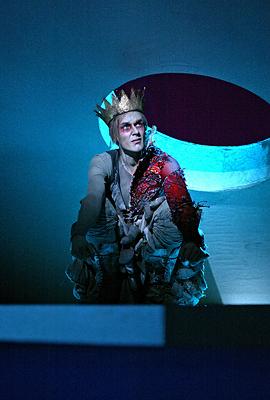|
<< -- 3 -- Robert Hugill INVOLVING AND MAGICAL

Towards the end of Act 1, Ferdinand comes into this enchanted world. Effectively sung by Toby Spence, he made a mellifluous hero, managing to look the part of the romantic hero even though forced to spend the opera wearing little more than a pair of baggy, ill-fitting trousers.

Left to right: Toby Spence (Ferdinand), Cyndia Sieden (Ariel) and Christine Rice (Miranda). © 2004 Clive Barda
|
As the drama developed, the wonderful semi-abstract set developed more features, notably a platform which rotated and inclined in a manner very reminiscent of Goetz Friedrich's first Ring at Covent Garden. The orchestra played magnificently, coping with the difficult music whilst never overly drawing attention to itself. Though he uses the orchestra to produce magical effects, it only supports and comments, never really developing its own voice. By the end of Act I, Adès and Oakes had very effectively set the drama in motion, but a little of the magic, of Prospero and of his island, seemed to be lacking -- I would like to have been more seduced by Prospero's magic.

Philip Langridge as The King of Naples (left) and Simon Keenlyside as Prospero. © 2004 Clive Barda
|
For Act 2, Oakes had successfully welded the remaining strands of Shakespeare's play into a single, effective scene for the King of Naples (a noble Philip Langridge) and his courtiers -- his brother Sebastian (a vivid, biting Christopher Maltman, his was one of the most highly characterised performances), Prospero's brother Antonio (tenor John Daszak, sounding a little stentorian, but proving a very effective contrast to Toby Spence's more lyrical tenor), the noble counsellor Gonzalo (Gwynne Howell playing the sort of character he could probably do in his sleep, but doing it most effectively) and the comic servants Trinculo (counter-tenor Lawrence Zazzo) and Stefano (Stephen Richardson).

Ian Bostridge as Caliban. © 2004 Clive Barda
|
The ensembles, centered on the King of Naples' laments for his son Ferdinand, were highly effective and made especially poignant as Prospero has confined Ferdinand in a cage around which the courtiers mill unseeing. Where the element of weakness crept in was in the scenes with the comic servants -- they just weren't comic, despite a great deal of work by Zazzo and Richardson. It was, however, a neat piece of vocal casting to use Zazzo's counter-tenor to provide an element of contrast in a piece heavy with male roles. Caliban has a magical and almost Ariel-like aria as he seduces the foolish humans, his verbal felicity contrasting with Ariel's almost non-verbal vocal acrobatics. Act 2 closes with a lovely duet for Spence and Rice, where Miranda sets Ferdinand free. Observing their love, Prospero seems human for once.
Continue >>
Copyright © 19 February 2004
Robert Hugill, London UK

|

